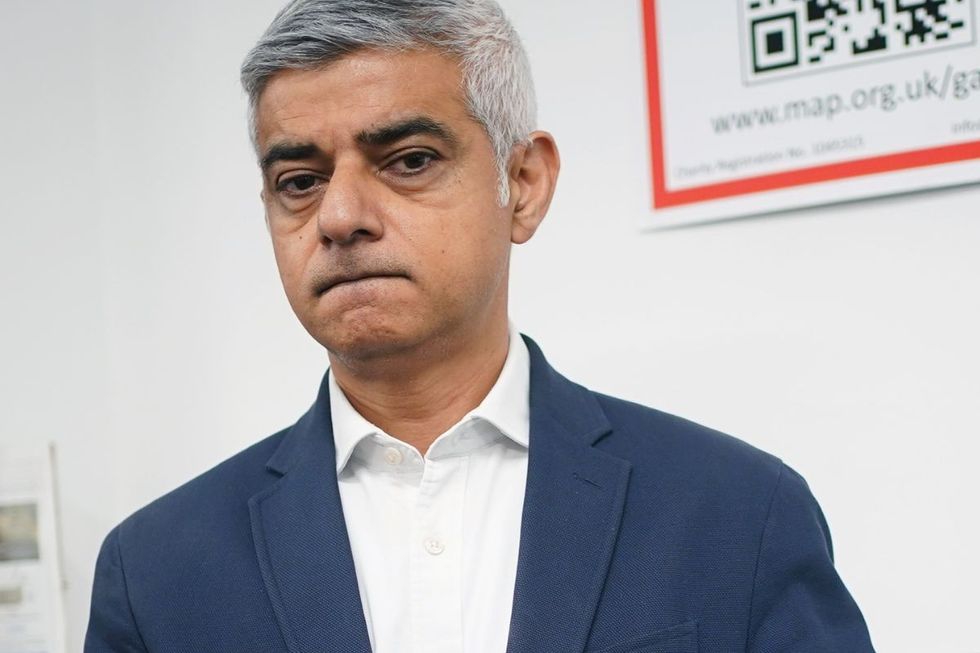Starmer gives Sadiq Khan and Andy Burnham more power as new law revealed
GETTY
Devolution remains a contentious issue as the reputation of England’s mayors varies drastically
Don't Miss
Most Read
Trending on GB News
Sir Keir Starmer has used the King’s Speech to hand Sadiq Khan and Andy Burnham more powers in a push to embolden devolved administrations.
Starmer’s English Devolution Bill hopes to increase economic output across the nation’s regions by providing a more consistent approach.
Labour is echoing the 2016 Brexit push of taking back control by strengthening mayoral powers, empowering communities and standardising the framework.
Setting out plans for the year ahead, the King told MPs and peers said: “My Government believes that greater devolution of decision making is at the heart of a modern dynamic economy and is a key driver of economic growth and my Ministers will introduce an English Devolution Bill.
 Starmer gives Sadiq Khan and Andy Burnham more power as new law revealedGETTY
Starmer gives Sadiq Khan and Andy Burnham more power as new law revealedGETTY“Legislation will be introduced to give new powers to metro mayors and combined authorities. This will support local growth plans that bring economic benefit to communities.”
Ahead of the King’s Speech, Starmer added: “Democratic decisions are best made by people with skin in the game, so my government will push power out of Westminster and empower local leaders to deliver for their communities.
“Local growth plans will make sure that every community can seize the opportunities ahead of us and every person can benefit from higher growth.”
Despite both men having rather different legacies, the decision will empower Burnham and Khan.
In an Ipsos poll conducted ahead of May’s local elections, Burnham’s net approval rating stood at 44 per cent in Greater Manchester.
Voters in the capital were far more critical of Khan, with the London Mayor’s net approval sitting in the red at -2 per cent.
Khan’s most controversial move came in August 2023 when the London Mayor opted to expand the carbon-curbing Ulez area to outer boroughs.
LATEST DEVELOPMENTS: Sadiq Khan spoke openly about his plans for UlezPA
Sadiq Khan spoke openly about his plans for UlezPAThe decision sparked outrage as demonstrators protested against the move, with the Tories managing to hold onto Uxbridge & South Ruislip last summer following an anti-Ulez backlash.
Following Khan’s re-election on 43.8 per cent of the vote in May, Labour made 10 gains as Tory support collapsed to just 20.4 per cent in the capital on July 4.
The Prime Minister hopes the move will introduce new powers and duties for local leaders to produce Local Growth Plans.
It will also ensure mayors and Combined Authorities can get on and deliver for their areas.
The decision comes after the OECD warned the UK could increase productivity across all cities by an average of 12 per cent if it adopted a Helsinki-style model.
Britain is currently more centralised than most comparative economies, including France and Germany.
James Stevens, director for cities at the Home Builders Federation said: “Giving all eleven metro mayoral combined authority areas spatial plan making powers would be a very important step in addressing the housing crisis, enabling them to address the problem of very large unmet housing needs that are accumulating in some cities like Birmingham and Bristol.”
 Andy Burnham has been re-elected as the mayor of Greater Manchester, picking up 63.4 per cent of the votePA
Andy Burnham has been re-elected as the mayor of Greater Manchester, picking up 63.4 per cent of the votePAHowever, devolution remains a contentious issue as the reputation of England’s mayors varies drastically.
Despite disaffection with the Tory Party, Tees Valley Mayor Lord Ben Houchen clung onto his role in May’s local elections.
England currently has 12 regional mayors, with 11 being elected from the Labour Party.
Anti-devolution sentiment is sizeable, albeit in a minority, in Wales.
The Welsh Parliament was rocked this week by turmoil after Vaughan Gething announced his resignation as Welsh First Minister.
The power handed to mayors in England also varies, with Khan being able to pull more levers than his colleagues.
The London Mayor is responsible for TfL, the congestion charge and manages the Metropolitan Police’s commissioner.
Khan can also opt to intervene in overall planning applications for developments but usually opts to steer clear and instead set affordable housing targets.
Following a “trailblazer scheme” last year, Burnham’s brief in Greater Manchester was extended beyons transport, policing and fire to cover financing and retrofitting houses.
However, other metro mayor areas were not given the new scheme and most have less powers, including in Cambridgeshire & Peterborough and Liverpool City Region.








